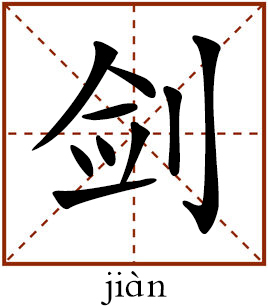Swords

More than simply ornaments, swords in Chinese culture are symbols of one’s aspiration to contribute to society and can represent the sorrow of being unable to do so when one is not provided with fair opportunities.
华山论剑
huàshān lùn jiàn
Huashan refers the Huashan Mountain. Jian means “swords.” Lunjian means to have a contest on swordsmanship or in a broader sense, martial arts. This proverb, taken literally, means contesting swordsmanship on top of Huashan Mountain.
This idiom originates from The Legends of Condor Heroes by Louis Cha Leung-yung (1924- ) or more famously known as Jin Yong, a top writer of martial arts literature. The top five masters of martial arts in the wuxia world in this novel once competed in Kung Fu skills on top of Huashan Mountain to determine who the greatest master was.
This idiom is used when top scholars or players in certain domains, for example, economics or tennis, gather together to discuss issues or test their skills against one another.
故剑情深
gù jiàn qíngshēn
Gu means “old.” Jian refers to swords. Qing means “feeling.” Shen means “deep.” This proverb, taken literally, means having deep love for an old sword (that one previously owned.)
According to the Book of Han by Ban Gu (32-92), Liu Xun lived a difficult life before he came to the throne. His wife, Xu Pingjun remained by his side when he faced difficulties. When he became the emperor, the ministers generally proposed that he should marry the daughter of Huo Guang, the most powerful minister, and announce her as the empress. Intending to announce Xu as the empress, Liu Xun issued an imperial decree, saying “I had an old sword when I had a humble station. I loved it very much. Please help me find it.” This indicated that he had deep feelings for his old sword. How could he abandon his wife who stayed with him through all the difficult times?
This idiom is used later to say that one would never abandon his or her life partner, who has remained loyal through difficult times.
(edied by CHEN ALONG)
